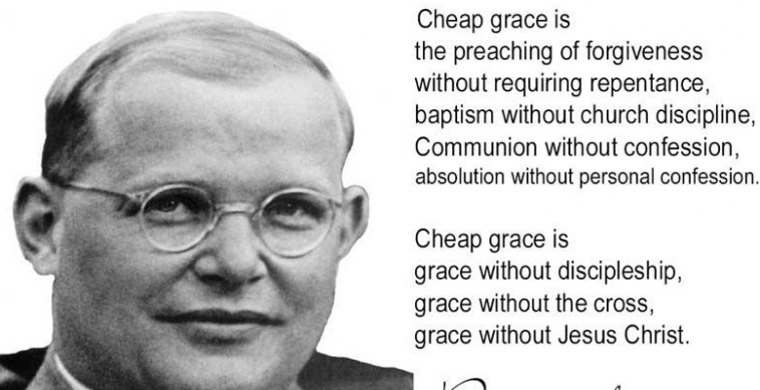The 70th Anniversary of the End of World War II:
Dietrich Bonhoeffer's Letter and Papers from Prison
By Sarah Frances Ives
Special to Virtueonline
www.virtueonline.org
September 2, 2015
Today is the 70th anniversary of the end of World War II when Japan surrendered. In preparation for this event, I watched a movie Tora! Tora! Tora! about the bombing of Pearl Harbor. I also watched a PBS movie called "Bonhoeffer: Agent of Grace." I watched historical videos from WWII. In prayer I pondered some of Bonhoeffer's writings from his Letters and Papers from Prison.
The horrors of WWII still cling to us. The images of violence and death show us human depravity at its most extreme. It shows where we can end without the power of the grace of Jesus Christ.
The German philosopher Martin Heidegger writes of how we are thrown into existence and that phrase captures so much of our lives. In the 1930s and 1940s, millions of people were thrown into this dreadful war. In particular, the Lutheran pastor Dietrich Bonhoeffer was thrown into a dreadful era of history, thrown into a concentration camp, and thrown finally into walking naked to a hangman's noose where he would end his worldly life. Hitler had seen that he was going to lose the war and he personally ordered the execution of Dietrich and his friends.
But on the way to Dietrich's death, so many amazing things happened in his life. As we know, Dietrich had already spent a year at Union Theological Seminary in New York and had his path out of the situation in Germany. But Dietrich said that he could not take this because if he did not suffer with his people, he would not have the right to rebuild the church after the war. One way he stated that he came to this understanding was his involvement with the Abyssinian Baptist Church in Harlem. He loved the gospels and spiritual sung there and recorded them. He wrote home about the open emotional worship this church had moving with the Spirit. He also appreciated this church's great social involvement in the world around them. Under the pressures of WWII, Dietrich found Christian community in a world so unlike his own Lutheran tradition in Germany.
Later as he organized the underground Confessing Church in Germany, he took this strong faith that God's acts in our world and he helped reach out to German pastors everywhere. About 1/3 of the German clergy took a stand against what Hitler was doing and formed a group called the "Pastor's Emergency League." Later many signed the Barmen Declaration in which they tried to formulate the principles of the Christian faith.
When the clergy came together to make this Barmen Declaration, they presented a document to the authorities that did not quote the great German philosophers of whom there are many. Instead, they quoted the Bible over and over again. These are among the first scriptures in the Barmen Declaration: "Jesus himself has said, 'I will never leave you, nor forsake you.' Therefore, 'Fear not, little flock, for it is your Father's good pleasure to give you the kingdom.'" They knew the power of scripture in our desolate world.
Bonhoeffer also became a double agent and tried to communicate to England what was going on in Germany. He was also part of a failed plot to assassinate Hitler.
Finally, Martin Niemoller and Dietrich Bonhoeffer were imprisoned with many others of different cultures, races, and religions. In this fiery furnace, they found love and they communicated one with another. Some historians call this the beginning of the ecumenical movement, when love sprang up as a gift in the worst of situations. When many lived in this pure destruction, Jesus Christ was present.
The witness of the WWII Christian still encourages us in our world with so many violent horrors occurring. But the grace of Jesus Christ reaches out, even in concentration camps, even in a world racked by incredible hatred and the murder of millions of people.
So today I remember with thanksgiving the work of Christians in WWII. On the 70th Anniversary of the end of WWII, I remember a quote from Bonhoeffer's Letters and Papers from Prison, written on August 14, 1944. He was reflecting on II Corinthians 1:20 which reads, "For all the promises of God find their Yes in him. That is why we utter the Amen through him, to the glory of God."
Bonhoeffer writes to a friend saying, "God does not give us everything we want, but he does fulfill his promises, i.e. he remains the Lord of the earth, he preserves his church, constantly renewing our faith and not laying on us more than we can bear, gladdening us with his nearness and help, hearing our prayers, and leading us along the best and straightest paths to himself. By his faithfulness in doing this, God creates in us praise for himself."
Dietrich Bonhoeffer, Letters and Papers from Prison. 1971. New York: Collier Books, pg. 387.
Sarah Francis Ives holds a Ph.D. in church history and lives in Washington DC. She is a regular contributor to Virtueonline














